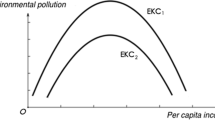Abstract
BRICS economies are facing severe environmental issues that exert a detrimental impact on human health. The analysis intends to examine the impact of CO2 emissions, environmental policy stringency, and environmental innovations on health outcomes for the BRICS economies. The long-run results of the ARDL-PMG infer that CO2 has a significant negative in the life expectancy model while it has a significant positive in the death rate model. These findings imply that the rise in CO2 emissions reduces life expectancy and increases the death rate in BRICS economies. On the other side, the estimates of environmental innovation and environmental policy stringency are positively significant in the life expectancy model; however, in the death rate model, the estimate of environmental innovation is insignificant, and environmental policy stringency is negatively significant in the death rate model. In a nutshell, the findings imply that CO2 emissions exacerbate health problems, environmental innovations, and environmental policy stringency, improving the health status of the people. Our findings suggest that the BRICS economies should revisit their environmental policies for the betterment of human health.
Similar content being viewed by others
Data availability
The datasets/materials used and/or analyzed for the present manuscript are available from the corresponding author upon reasonable request.
References
Aldieri L, Bruno B, Vinci CP (2019) Does environmental innovation make us happy? An empirical investigation. Socioecon Plann Sci 67:166–172
Aldieri L, Bruno B, Vinci CP (2021) A multi-dimensional approach to happiness and innovation. Appl Econ 53(11):1300–1310
Aldieri L, Vinci CP (2021) Technological innovation for environmental sustainability and quality of life. In Quality of Life. CRC Press, pp. 97–109
Aslam B, Hu J, Majeed MT, Andlib Z, Ullah S (2021) Asymmetric macroeconomic determinants of CO2 emission in China and policy approaches. Environ Sci Pollut Res 28(31):41923–41936
Åström DO, Bertil F, Joacim R (2011) Heat wave impact on morbidity and mortality in the elderly population: a review of recent studies. Maturitas 69(2):99–105
Azam M, Awan AM (2022) Health is wealth: a dynamic SUR approach of examining a link between climate changes and human health expenditures. Soc Indic Res 1–24
Bahmani-Oskooee M, Usman A, Ullah S (2020) Asymmetric impact of exchange rate volatility on commodity trade between Pakistan and China. Glob Bus Rev. https://doi.org/10.1177/0972150920916287
Baloch MA, Danish, Qiu Y (2022) Does energy innovation play a role in achieving sustainable development goals in BRICS countries? Environ Technol 43(15):2290–2299
Butler CD, Harley D (2010) Primary, secondary and tertiary effects of eco-climatic change: the medical response. Postgrad Med J 86(1014):230–234
Chaabouni S, Zghidi N, Mbarek MB (2016) On the causal dynamics between CO2 emissions, health expenditures and economic growth. Sustain Cities Soc 22:184–191
Chen J, Rojniruttikul N, Kun LY, Ullah S (2022) Management of green economic infrastructure and environmental sustainability in one belt and road enitiative economies. Environ Sci Pollut Res 29(24):36326–36336
Costello A, Abbas M, Allen A, Ball S, Bell S, Bellamy R, Friel S, Groce N, Johnson A, Kett M, Lee M, Levy C, Maslin M, McCoy D, McGuire B, Montgomery H, Napier D, Pagel C, Patel J, de Oliveira JA, Redclift N, Rees H, Rogger D, Scott J, Stephenson J, Twigg J, Wolff J, Patterson C (2009) Managing the health effects of climate change: Lancet and University College London Institute for Global Health Commission. Lancet 373(9676):1693–1733
DeMarini DM, Mutlu E, Warren SH, King C, Gilmour MI, Linak WP (2019) Mutagenicity emission factors of canola oil and waste vegetable oil biodiesel: Comparison to soy biodiesel. Mutat Res Genet Toxicol Environ Mutagen 846:403057
Dimitrova A, Ingole V, Basagana X, Ranzani O, Mila C, Ballester J, Tonne C (2021) Association between ambient temperature and heat waves with mortality in South Asia: systematic review and meta-analysis. Environ Int 146:106170
Do QT, Joshi S, Stolper S (2018) Can environmental policy reduce infant mortality? Evidence from the Ganga Pollution Cases. J Dev Econ 133:306–325
Dong H, Xue M, Xiao Y, Liu Y (2021) Do carbon emissions impact the health of residents? Considering China’s industrialization and urbanization. Sci Total Environ 758:143688
Du K, Li P, Yan Z (2019) Do green technology innovations contribute to carbon dioxide emission reduction? Empirical evidence from patent data. Technol Forecast Soc Chang 146:297–303
Edwards-Schachter ME, Matti CE, Alcántara E (2012) Fostering quality of life through social innovation: a living lab methodology study case. Rev Policy Res 29(6):672–692
Fayissa B, Gutema P (2005) Estimating a health production function for Sub-Saharan Africa (SSA). Appl Econ 37(2):155–164
Gasimli O, Gamage SKN, Prasanna RPIR, Khattak ZZ, Abbas A (2022) Energy, environmental degradation, and health status: evidence from South Asia. Environ Sci Pollut Res 1–9
Grossman L (1972) Condensation in the primitive solar nebula. Geochim Cosmochim Acta 36(5):597–619
Hill TD, Jorgenson AK, Ore P, Balistreri KS, Clark B (2019) Air quality and life expectancy in the United States: an analysis of the moderating effect of income inequality. SSM-Popul Health 7:100346
Ibrahim MF, Hod R, Nawi AM, Sahani M (2021) Association between ambient air pollution and childhood respiratory diseases in low-and middle-income Asian countries: a systematic review. Atmos Environ 256:118422
Ilic S, Petrovic T, Djukic G (2022) Eco-innovation and sustainable development. Probl Ekorozwoju 17(2)
Kelly FJ, Fussell JC (2015) Air pollution and public health: emerging hazards and improved understanding of risk. Environ Geochem Health 37(4):631–649
Kovats RS, Hajat S (2008) Heat stress and public health: a critical review. Annu Rev Public Health 29:41–55
Landrigan PJ (2018) Pollution, climate change, and global public health: social justice and the common good. Lancet 391(10119):462–512
Laumbach RJ, Kipen HM (2012) Respiratory health effects of air pollution: update on biomass smoke and traffic pollution. J Allergy Clin Immunol 129(1):3–11
Lei W, Xie Y, Hafeez M, Ullah S (2022) Assessing the dynamic linkage between energy efficiency, renewable energy consumption, and CO2 emissions in China. Environ Sci Pollut Res 29(13):19540–19552
Li X, Ozturk I, Majeed MT, Hafeez M, Ullah S (2022) Considering the asymmetric effect of financial deepening on environmental quality in BRICS economies: policy options for the green economy. J Clean Prod 331:129909
Luo Y, Salman M, Lu Z (2021) Heterogeneous impacts of environmental regulations and foreign direct investment on green innovation across different regions in China. Sci Total Environ 759:143744
Majeed MT, Ozturk I (2020) Environmental degradation and population health outcomes: a global panel data analysis. Environ Sci Pollut Res 27(13):15901–15911
McMichael AJ (2013) Globalization, climate change, and human health. N Engl J Med 368(14):1335–1343
Mujtaba G, Shahzad SJH (2021) Air pollutants, economic growth and public health: implications for sustainable development in OECD countries. Environ Sci Pollut Res 28(10):12686–12698
Naeem MZ, Arshad S, Birau R, Spulbar C, Ejaz A, Hayat MA, Popescu J (2021) Investigating the impact of CO2 emission and economic factors on infants health: a case study for Pakistan. Industria Textila 72(1):39–49
Ngo NS, Horton RM (2016) Climate change and fetal health: the impacts of exposure to extreme temperatures in New York City. Environ Res 144:158–164
Pesaran MH, Shin Y (1995) An autoregressive distributed lag modelling approach to cointegration analysis. Cambridge Working Papers in Economics 9514, Faculty of Economics, University of Cambridge, Cambridge
Pesaran MH, Shin Y, Smith RP (1999) Pooled mean group estimation of dynamic heterogeneous panels. J Am Stat Assoc 94(446):621–634
Protocol K (1997) United Nations framework convention on climate change. Kyoto Protocol, Kyoto 19(8):1–21
Rosenzweig C, Solecki WD, Hammer SA, Mehrotra S (Eds.) (2011) Climate change and cities: first assessment report of the urban climate change research network. Cambridge University Press, Cambridge
Sarkodie SA, Strezov V, Jiang Y, Evans T (2019) Proximate determinants of particulate matter (PM2.5) emission, mortality and life expectancy in Europe, Central Asia, Australia, Canada and the US. Sci Total Environ 683:489–497
Siddique HMA, Kiani AK (2020) Industrial pollution and human health: evidence from middle-income countries. Environ Sci Pollut Res 27(11):12439–12448
Sohail MT, Ullah S, Majeed MT, Usman A (2021) Pakistan management of green transportation and environmental pollution: a nonlinear ARDL analysis. Environ Sci Pollut Res 28(23):29046–29055
Su CW, Dai K, Ullah S, Andlib Z (2021) COVID-19 pandemic and unemployment dynamics in European economies. Econ Res -Ekonomska Istraživanja 1–13
Tang L, Li K, Jia P (2020) Impact of environmental regulations on environmental quality and public health in China: empirical analysis with panel data approach. Sustainability 12(2):623
Ullah S, Ozturk I, Majeed MT, Ahmad W (2021) Do technological innovations have symmetric or asymmetric effects on environmental quality? Evidence from Pakistan. J Clean Prod 316:128239
Usman A, Ozturk I, Hassan A, Zafar SM, Ullah S (2021) The effect of ICT on energy consumption and economic growth in South Asian economies: an empirical analysis. Telematics Inform 58:101537
Usman A, Ozturk I, Naqvi SMMA, Ullah S, Javed MI (2022) Revealing the nexus between nuclear energy and ecological footprint in STIRPAT model of advanced economies: fresh evidence from novel CS-ARDL model. Prog Nucl Energy 148:104220
Wei X, Ren H, Ullah S, Bozkurt C (2022) Does environmental entrepreneurship play a role in sustainable green development? Evidence from emerging Asian economies. Econ Res-Ekonomska Istraživanja 1–13
Woodward A, Howard N, Wolffers I (2014) Health and access to care for undocumented migrants living in the European Union: a scoping review. Health Policy Plan 29(7):818–830
World Health Organization (2016a) The World Health Report 2016a: mental health: climate change and health. World Health Organization
World Health Organization. (2016b) World malaria report 2015. World Health Organization
Yirong Q (2022) Does environmental policy stringency reduce CO2 emissions? Evidence from high-polluted economies. J Clean Prod 341:130648
Zhao W, Zhong R, Sohail S, Majeed MT, Ullah S (2021) Geopolitical risks, energy consumption, and CO2 emissions in BRICS: an asymmetric analysis. Environ Sci Pollut Res 28(29):39668–39679
Funding
This work was supported by the National Natural Science Foundation of China (Grant No. 72274116 and 71673121), Guangdong Basic and Applied Basic Research Foundation (Grant No. 2021A1515011599), STU Scientific Research Initiation Grant (Grant No. STF20012) and Open Fund of Key Research Base of Philosophy and Social Science of Higher Education in Guangdong Province-Local Government Development Research Institute of Shantou University (Grant No. 07419005 and 07421005).
Author information
Authors and Affiliations
Contributions
The idea was given by Hong Jinag and Wenxin Wang. Muhammad Hafeez, Hong Jinag, Wenxin Wang, and Waseem Ahmad, and they have done the data acquisition and analysis and written the whole draft. Hammad Badar and Ruafhon Salahodjev read and approved the final version.
Corresponding author
Ethics declarations
Ethics approval
Not applicable.
Consent to participate
I am free to contact any of the people involved in the research to seek further clarification and information.
Consent for publication
Not applicable.
Conflict of interest
The authors declare no competing interests.
Additional information
Responsible Editor: Philippe Garrigues
Publisher's note
Springer Nature remains neutral with regard to jurisdictional claims in published maps and institutional affiliations.
Rights and permissions
Springer Nature or its licensor (e.g. a society or other partner) holds exclusive rights to this article under a publishing agreement with the author(s) or other rightsholder(s); author self-archiving of the accepted manuscript version of this article is solely governed by the terms of such publishing agreement and applicable law.
About this article
Cite this article
Wang, W., Hafeez, M., Jiang, H. et al. Environmental factors and its influence on human health in BRICS: implications for human development. Environ Sci Pollut Res 30, 22509–22519 (2023). https://doi.org/10.1007/s11356-022-23678-2
Received:
Accepted:
Published:
Issue Date:
DOI: https://doi.org/10.1007/s11356-022-23678-2




